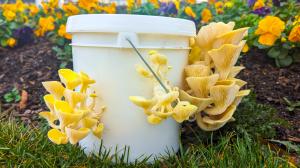
Mushrooms play a critical role in nutrient cycling and ecosystem functioning by decomposing organic matter.
— Clyde Lake
SPRINGFIELD, VA, USA, April 5, 2024 /EINPresswire.com/ — In a remarkable display of nature’s cycles, this spring is set to witness an event dubbed “cicada-geddon,” where trillions of cicadas, some of which will be transformed into ‘zombie cicadas’ by a sexually transmitted fungus, will emerge across several U.S. states. This remarkable event, captivating in its own natural complexity, underscores the significant role fungi can play—not only in altering insect populations but also as critical elements in promoting human health and protecting the environment. Virginia Spores, a visionary company nestled in the Washington DC metro area, draws inspiration from fungi’s transformative power and its vital role in nature.
The strange interaction between fungi and cicadas draws attention to fungi’s adaptive strategies and highlights one reason we can cultivate mushrooms. Some mushrooms, called saprotrophic fungi, decompose organic matter. This characteristic provides a means to grow mushrooms in agriculture by-products and household waste products, including corn husks, compost, coffee grounds, petroleum, and plastics. Saprotrophic fungi turn the waste products into simpler substances that can be absorbed as nutrients. These organisms play a critical role in nutrient cycling and ecosystem functioning by decomposing organic matter.
Harnessing this adaptability allows for innovative approaches that simplify household mushroom cultivation. Virginia Spores co-founder Clyde Lake envisions a future where mushroom cultivation at home contributes to a greener, more sustainable world. “Edible Fungi are the ultimate recyclers. We can turn our household waste into edible food. Edible fungi will play an increasing role in humans’ lives in the near future,” Lake reflects.
In the heart of Springfield, Virginia, a small business is making waves in sustainable agriculture and wellness. Virginia Spores & More is at the forefront of a green revolution, proving that the future of food and medicine may well be fungal. This company isn’t just about mushrooms; it’s about a vision where home cultivation contributes significantly to human wellness, environmental conservation, and food security.
The Power of Fungi
Mushrooms have been revered for centuries for their medicinal properties and as a source of food. Yet, only recently has Western science begun to embrace their potential fully. From boosting immune systems to breaking waste into usable compost, mushrooms offer various benefits for human health and the planet.
Virginia Spores & More is leveraging this untapped potential by simplifying the cultivation process. “We believe that by making mushroom cultivation accessible, we’re not just teaching people how to grow food; we’re empowering them to take charge of their health and environment,” says Lake.
A Solution to Modern Challenges
Virginia Spores & More work provides a beacon of hope in an era of food deserts and unsustainable agricultural practices. Growing mushrooms at home can significantly reduce grocery bills, provide nutritious food options, and offer medicinal benefits, all while using minimal space and resources.
“Mushrooms are the ultimate superfood,” Lake explains. “They require less water and space than traditional crops and can be grown year-round. This isn’t just about food security; it’s about creating resilient communities.”
Environmental Impact
The environmental benefits of mushroom cultivation are profound. Mushrooms can remediate soil, break down pollutants, and improve land health. This aspect of fungal technology, known as mycoremediation, represents a critical tool in the fight against pollution.
Furthermore, individuals can reduce their carbon footprint by growing mushrooms at home using simple kitchen equipment. “Every little bit helps,” Lake notes. “If we can reduce the demand for commercially grown mushrooms, we can lessen the environmental impact of agriculture.”
Growing mushrooms at home embodies principles of renewal, sustainability, and coexistence with nature.
A Greener Future
Virginia Spores and More is dedicated to educating the public about mushrooms’ environmental and health benefits. Through workshops, online resources, and community engagement, they’re spreading the word about how mushrooms can lead to a healthier, more sustainable world.
The implications for the future are significant. As more individuals and communities embrace mushroom cultivation, we could see a shift towards more sustainable food systems, reduced food waste, and greater food sovereignty.
Clyde Lake
Virginia Spores & More
+1 571-482-4142
email us here
Visit us on social media:
Facebook
Twitter
Instagram
![]()
Originally published at https://www.einpresswire.com/article/701530916/from-zombie-cicadas-to-a-greener-future-fungi-s-role-in-the-future


